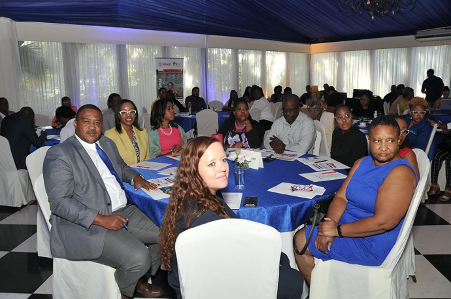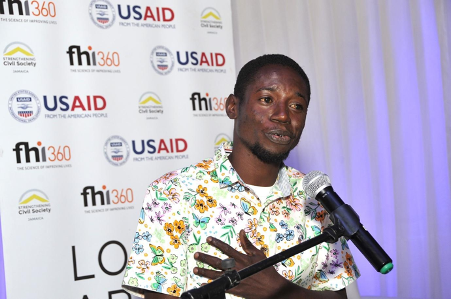Growing up with a mother who was a part of the infamous Stone Crusher Gang, Samir Petgrave couldn’t help but be around them too.
Petgrave, who hails from Glendevon, St. James, said his life was completely transformed, however, when he entered the USAID-funded Local Partner Development (LPD) Activity programme funded by FHI 360. He revealed that this decision came down to a choice between life and death—he chose life.
Around that time his community was facing an active war with persons from another street where he actually grew up.
“So Dr. Chang (Minister of Security) came, and he saw four of us in the lane, and he stopped with his unit, and he came out and asked why is this going on, and I approached him because people don’t understand that a lot of people look from a distance and just assume and judge, and never really come inside to ask, but what’s really going on? So that gave me the courage to open up to Mr. Chang,” he shared on his journey to being a part of the FHI360 LPD programme.

Petgrave started out in the commercial truck driving training programme at an army base in Flankers. Although it was going “pretty good” with him being at the top of the class, he had to discontinue due to a lack of funds.
“You know it takes funds for taxi fare, lunch money, so I had to drop out of the programme (the certification process to become a licenced commercial truck driver). I sent out some resumes and I got into the Hyatt Resort in MoBay, and I stuck with the programme all the way through, even though I wasn’t benefiting from it as everybody else; I stuck with it because it helped me and it helped a lot of people in the community,” he added.
For Petgrave, people can be steered towards the straight and narrow by just receiving a helping hand and a listening ear—with that, he pointed out that anything is possible.
Petgrave was among the beneficiaries of the USAID-funded Local Partner Development (LPD) Activity, implemented by FHI360. Close to 140 stakeholders from government, civil society, and the private sector attended the closing event for the six-year project recently and had nothing but praise for the impact it had on their lives.
Emerson Benjamin, who lives in the volatile community of Majestic Garden, is now a trained AC technician with an international standard certificate.
He said the programme came about at the lowest point in his life, and now he, along with his business partner, Nigel Francis, are mentoring 13 youths through his Positive Impact Foundation in his community of Majestic Garden, a place he said many wouldn’t even think to visit.
“Most of them know where we are coming from and where we are going because I explain it to them, so moving forward, I am creating the group Positive Impact, and we are trying to be more private instead of going public with what we really want to do. We want to start in a volatile community like our own. So mainly right now, we’re starting three projects. We have the elderly, for whom we go around and give out gift baskets from other sponsors. We have a poultry-rearing project where international bodies sponsor us, so we make more by putting ourselves out there instead of waiting for someone to come and give us,” he explained.
Through his foundation, he is also seeking to assist the elderly, provide aid to burn victims, and start a chicken farm involving youths.
Meanwhile, Dr. Chang said the Ministry will be seeking to expand the use of methods that worked under the programme, alongside local efforts, to reduce violence among the nation’s youths.
“The agency (the Planning Institute of Jamaica) has done some outstanding work in terms of social and demographic surveys and investigations across the country, and it’s there that they’ve identified over the years just over 100 communities that are considered vulnerable in terms of violence and the development of crime,” he pointed out.
The National Security Minister added that schools and community-based institutions located in these communities will require extraordinary support to serve in these areas.






